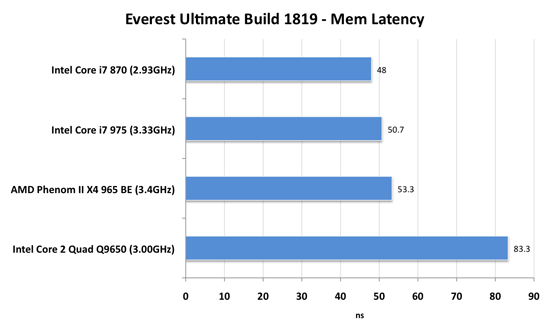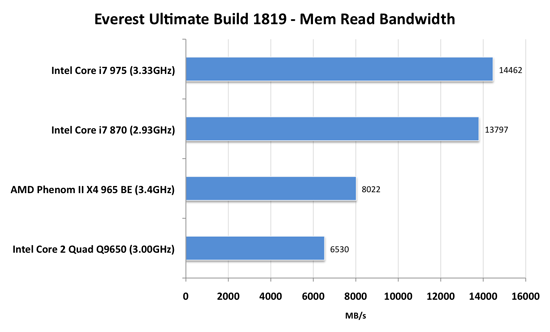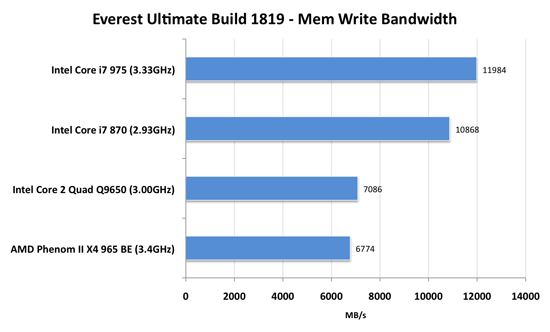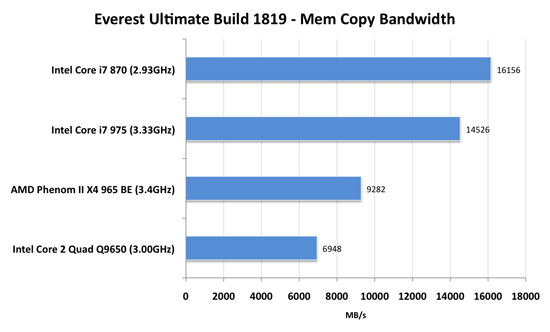Intel's Core i7 870 & i5 750, Lynnfield: Harder, Better, Faster Stronger
by Anand Lal Shimpi on September 8, 2009 12:00 AM EST- Posted in
- CPUs
Discovery: Two Channels Aren't Worse Than Three
Intel told me something interesting when I was out in LA earlier this summer: it takes at least 3 cores to fully saturate Lynnfield's dual-channel DDR3-1333 memory bus. That's three cores all working on memory bandwidth intensive threads at the same time. That's a pretty stiff requirement. In the vast, vast majority of situations Lynnfield's dual channel DDR3 memory controller won't hurt it.
Move up to 6 or 8 core designs and a third memory channel is necessary, and that's why we'll see those processors debut exclusively on LGA-1366 platforms. In fact, X58 motherboards will only need a BIOS update to work with the 6-core 32nm Gulftown processor next year. P55 looks like it'll be limited to four cores and below.
Because of this, Lynnfield's memory bandwidth and latency cores are actually quite similar to Bloomfield. I used Everest to look at memory bandwidth and latency between a Core i7 975 and Core i7 870 (Lynnfield):

Lynnfield's memory controller is good, easily as good as what's in Bloomfield if not slightly better.



Both processors turbo'd up to 3.46GHz, indicating that Everest's memory test uses no more than two threads. The 975 ran DDR3-1066 memory (the highest it officially supports), while the 870 used DDR3-1333. The faster memory gave the 870 the advantage. Since we're not taxing all four cores, Lynnfield is at no disadvantage from a bandwidth perspective. Surprisingly enough, even SiSoft Sandra (which does use four cores for its memory bandwidth test) shows Lynnfield's dual-channel DDR3-1333 memory controller as equal to Bloomfield's triple-channel DDR3-1066 interface.
| SiSoft Sandra 2009.SP4 | Intel Core i7 975 | Intel Core i7 870 |
| Aggregate Memory Bandwidth | 17.8 GB/s | 17.3 GB/s |
Long story short? Lynnfield won't be memory bandwidth limited with DDR3-1333 for the overwhelming majority of usage cases.










343 Comments
View All Comments
Gary Key - Wednesday, September 9, 2009 - link
Actually the manufacturers wanted Clarkdale desperately for the school/holiday shopping seasons. It is delayed as they are still debugging the platform, unofficially I think that means the drivers are not ready. ;) Believe me, if we had a stable Clarkdale platform worthy of a preview, you would have read about it already.justme2009 - Wednesday, September 9, 2009 - link
You are incorrect sir. The manufacturers were complaining to Intel that they couldn't get rid of the current stock before Intel released mobile Nehalem, so Intel caved.http://techreport.com/discussions.x/16152">http://techreport.com/discussions.x/16152
http://www.techspot.com/news/33065-notebook-vendor...">http://www.techspot.com/news/33065-note...-pushing...
http://www.brighthub.com/computing/hardware/articl...">http://www.brighthub.com/computing/hardware/articl...
http://gizmodo.com/5123632/notebook-makers-want-in...">http://gizmodo.com/5123632/notebook-mak...o-delay-...
Needless to say, I'm waiting for mobile Nehalem (clarkdale/arrendale). With a 32nm manufacturing process, plus starting in 2010, Intel will begin to move both the northbridge and southbridge chips onto the processor die. The move should complete some time around 2011 as far as I can tell.
It will be far better than what we have today, and I'm really ticked off at the manufacturers for holding back progress because of their profit margin.
Gary Key - Wednesday, September 9, 2009 - link
I spoke directly with the manufacturers, not unnamed sources. The story is quite different than the rumors that were posted. I will leave it at that until we product for review.justme2009 - Wednesday, September 9, 2009 - link
Of course the manufacturers wouldn't fess up to it. It's bad business, and it makes them look bad. It already angered a great many people. I don't think they are rumors at all.justme2009 - Wednesday, September 9, 2009 - link
Personally I'm holding off on buying a new system until the northbridge/southbridge migration to the processor die is complete, ~2 years from now. That will definitely be the time to buy a new system.ClagMaster - Tuesday, September 8, 2009 - link
“These things are fast and smart with power. Just wait until Nehalem goes below 65W...”I surely will Mr Shimpi with this exceptional processor. I am going to wait until the summer of 2010 when prices are the lowest, rebates are the sweetest, before I buy my i7 860. By that time, hopefully, there would be 65W versions available on improved stepping. It’s worth the wait.
I would wager the on-chip PCIe controller could use some additional optimization which would result in lower power draw for a given frequency.
Intel sure delivered the goods with Lynnfield.
cosminliteanu - Tuesday, September 8, 2009 - link
Well done Anandtech for this article... :)ereavis - Tuesday, September 8, 2009 - link
great article. Good replies to all the bashing, most seem to have misread.Now, we want to see results in AnandTech Bench!
MODEL3 - Tuesday, September 8, 2009 - link
Wow, the i5 750 is even better than what i was expecting...For the vast, vast majority of the consumers, (not enthusiasts, overclocking guys, etc...) with this processor Intel effectively erased the above 200$ CPU market...
I hope this move to have the effect to kill their ASP also... (except AMDs...) (not that this will hurt Intel much with so many cash, but it is better than nothing...)
I see that the structure/composition in this review and in many others tech sites reviews is very good, maybe this time Intel helped more in relation with the past regarding info / photos / diagrams / review guide etc...
One question that i have (out of the conspiracy book again...) is,
if the integration of the PCI-Express controller in the CPU die on the mainstream LGA-1156 platform will be a permanent strategy from now on...
and if the recent delay for the PCI-Express standard 3.0 has a connection with the timing of the launch of mainstream LGA-1156 based CPUs with PCI-Express 3.0 controller integrated...
Sure, they can launch future LGA-1156 motherboard chipsets with PCI-Express 3.0 controller, but doesn't this contradict the integration strategy that Intel just started with the new processors?
MODEL3 - Tuesday, September 8, 2009 - link
I can't edit...I just want to clarify that the PCI-Express 3.0 question is for LOL reasons, not taken serious...